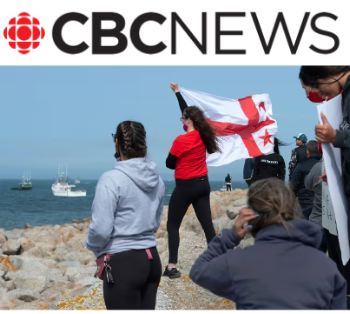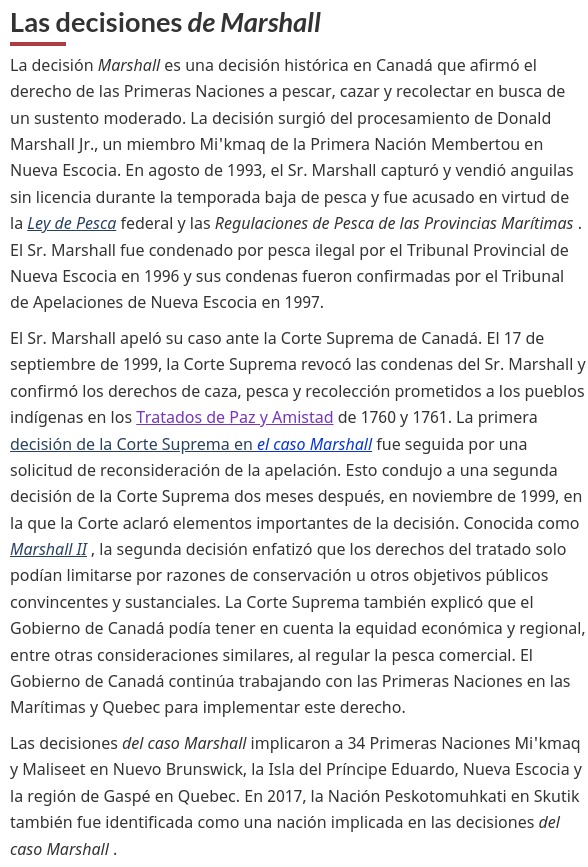|

Foto: CBC News/FIS
Líderes de las Primeras Naciones canadienses piden un camino claro hacia la pesca basada en los derechos
 CANADÁ
CANADÁ
Friday, September 20, 2024, 00:10 (GMT + 9)
25 years after Marshall's decision, calls for full implementation of treaty rights intensify
Twenty-five years after the Supreme Court of Canada affirmed the rights of Maritime First Nations to fish and sell their catch, Indigenous leaders are urging a unified approach to fully implement these treaty rights, CBC News reports .
 Kerry Prosper, a Mi'kmaw elder and former chief of the Paqtnkek First Nation in Nova Scotia , emphasizes the need for Mi'kmaq communities to come together under their traditional councils. He believes this cohesion is critical to strengthening relationships with each other, as well as with the fish and waters they depend on. Kerry Prosper, a Mi'kmaw elder and former chief of the Paqtnkek First Nation in Nova Scotia , emphasizes the need for Mi'kmaq communities to come together under their traditional councils. He believes this cohesion is critical to strengthening relationships with each other, as well as with the fish and waters they depend on.
"We have been separated due to constant resistance from the Department of Fisheries and Oceans (DFO) and commercial fishermen. Now, it is up to us to navigate this complex situation individually," Prosper told CBC News .
The landmark Supreme Court ruling in September 1999 arose from the case of Donald Marshall Jr., a Mi'kmaw man from the Membertou First Nation. Marshall was convicted of catching and selling eels without a license in Pomquet Harbour, Nova Scotia. He argued that the 1760-1761 Treaties of Peace and Friendship gave him the right to fish and sell, and the court sided with him, affirming the rights of the Mi'kmaq, Wolastoqiyik and Peskotomuhkati peoples to earn a "moderate" living through fishing, hunting and gathering.
However, the court also clarified that these rights could be regulated to address conservation or broader public concerns, a limitation that has since led to numerous conflicts over the definition and application of these rights.
.png)
Click on the image to enlarge
Reflecting on the ongoing struggle for recognition, Prosper noted similarities with the 1990 Sparrow Decision, which recognised Indigenous fishing rights specifically for food, social and ceremonial purposes. Following that decision, the Aboriginal Fisheries Strategy was created in 1992, with the aim of establishing a food, social and ceremonial fishery overseen by DFO.
Despite these resolutions, Prosper expressed frustration over ongoing tension between Indigenous and non-Indigenous fishers, particularly over the perceived threat of rights-based fisheries to commercial interests.
"Donald Marshall was simply defending his treaty rights. He wanted to make a living and exercise the agreement that gave him the right to fish , " Prosper tells CBC News.
Struggles for implementation continue
Despite the clarity of these legal victories, rights-based fisheries across Wabanaki territory remain fragmented due to the lack of a clear and coherent framework. This has led to tensions, notably at Esgenoopetitj (Burned Church) in 2000 and more recently at Sipekne'katik, Nova Scotia.
 On the 25th anniversary of the Marshall decision, Assembly of First Nations National Chief Cindy Woodhouse Nepinak renewed calls for all levels of government to respect the court’s rulings on treaty rights. She stressed the need for full integration of treaty rights into fisheries management to address ongoing economic disparities and conflicts. On the 25th anniversary of the Marshall decision, Assembly of First Nations National Chief Cindy Woodhouse Nepinak renewed calls for all levels of government to respect the court’s rulings on treaty rights. She stressed the need for full integration of treaty rights into fisheries management to address ongoing economic disparities and conflicts.
"These rights must not only be respected, but also fully incorporated into fisheries governance and economic opportunities for First Nations , " Woodhouse Nepinak told CBC News.
In response, a spokesperson for the Minister of Fisheries and Oceans acknowledged the challenges ahead and stressed the need for sustained collaboration with indigenous communities . “There is much work ahead to ensure treaty rights are respected, while maintaining sustainable and well-managed fisheries,” the statement reads , emphasizing the shared goals of conservation and responsible harvesting.


editorial@seafood.media
www.seafood.media
|



